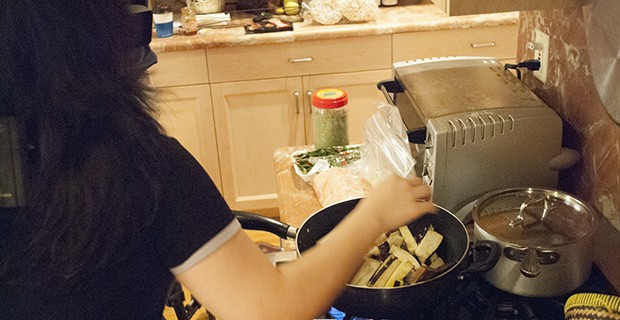
Being able to create delicious, healthy and beautifully presented dishes at home may seem like a daunting task to many but it’s certainly not the most difficult goal in the world. After having many of my own friends who are home cooks ask me questions that seemed to resound across the board, I decided to compile this short list to discuss what are some of the most common mistakes that home cooks make. With this knowledge in hand, hopefully you’ll change old habits and find out how slight adjustments in your technique or thought process can result in that gorgeous dish you wanted.
1. Thinking You Need To Follow A Recipe Exactly. With the exception of baking recipes, most of the time, you actually should not follow a recipe exactly, regardless of whether it’s in a book written by a famous professional chef or on some random food blog. Here’s why.
When chefs and home cooks create recipes, the details are all based on their environment. That means whether they’re using a gas or electric stove can make a big difference in cooking temperatures and times, as can the brand of the stove. Even something as seemingly unrelated as the ambient temperature in their kitchen can make a difference. Someone cooking in an environment with frigid winter temperatures will find differing times needed for bringing a pot of soup up to boil compared to someone in hot, humid zones.
So next time, before you go shaming some chef or food blogger for your failed dish, think carefully about whether it was really a terrible recipe or if the above conditions may have affected variations in required cooking temperatures and times between your environment and theirs. You’ve got to learn about your own environment- your stove’s nuances, your home’s ambient temperature, your oven’s quirks, etc. They’re mini relationships- this on-going journey you’ve got with your appliances and pots and pans. Treat them well and they’ll deliver for you.
2. The Urge To Constantly Move What You’re Cooking. Unless you’re preparing a stir-fry or some kind of sauce that requires constant whisking, more often than not, many recipes call for allowing a piece of meat or fish to sear, pan-fry, bake, etc. Especially when it comes to grilling or pan-frying, many people have the urge to take those tongs or spatula and check what’s going on with the side of meat or fish currently cooking. Big mistake. Allow the food to cook properly without giving in to your curiosity. This error is why people destroy fish and meats on a pan or grill. When food is done doing its thing on one side, you’ll be able to gently move or flip it easily without having to play tug of war.
3. Under Seasoning. Personally, I think there’s little worse than bland food. I acknowledge that in my older age there may come a time when I may have to eat tasteless, texture-less food but until then, I love my herbs and spices. Why are all the top chefs with great restaurants where they are? In good part, it’s because they know how to perfectly season their dishes. You can’t be stingy with salts, peppers, and other spices and herbs. These are what make or break a dish. Imagine the world’s most delectable, mouth-watering piece of Kobe beef, perfectly grilled to a medium rare. Trust me- without salt, you wouldn’t be able to enjoy it. Those moist, chewy Chocolate Chunk cookies? Again- disastrous without salt. Taste your creations as you’re creating them.
4. Over Seasoning. The problem with over seasoning- besides the obvious- is that you can end up altering the chemical reactions that are supposed to take place in a certain manner. For example, caramelized onions are one of the most popular toppings for poultry and meats and is pretty simple to make. Some people like to allow the onions’ natural sweetness to speak for itself while others like to add a dash of sugar or even honey into the mix. This latter technique can result in delicious and addictive sautéed onions. What happens if you add too much sugar or honey? Before the onions have had a chance to caramelize and wilt down properly, you’ll most likely end up with a burnt mess. Just like with under seasoning, you can eradicate the issue of over seasoning by tasting along the way. If you’re trying a dish from someone’ recipe for the first time, play it safe and go with their suggested seasonings. Once the dish is done, if you find that you prefer more seasoning you can always add more or do it next time around.
5. Being Afraid of Making Mistakes. I haven’t met a single top chef in the world who hasn’t built a career on learning from mistakes. I think this goes for everything in life, let alone creating dishes in a home kitchen. It’s just food. What’s the big deal about making mistakes? So you ruin a piece of chicken or the cake didn’t rise. It’s hardly the end of the world. Basic rules dictate that you should never try a new recipe when you’re having people over. If you’re cooking for yourself or for the family, you’re more than allowed to mess up. How can you ever improve without making mistakes? How can you improve if you’re afraid of tackling what may seem like harder recipes because you think you’ll make mistakes? You will make mistakes in the kitchen. Even the best chefs in the world still make mistakes. We all do. Get over it and get to enjoying cooking and food.



 Welcome to Food, Travel & Life with The Asian Fusion Girl. Learn more about the AF Girl and her various projects
Welcome to Food, Travel & Life with The Asian Fusion Girl. Learn more about the AF Girl and her various projects





